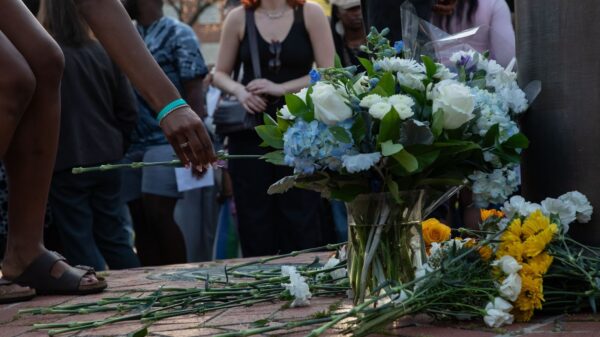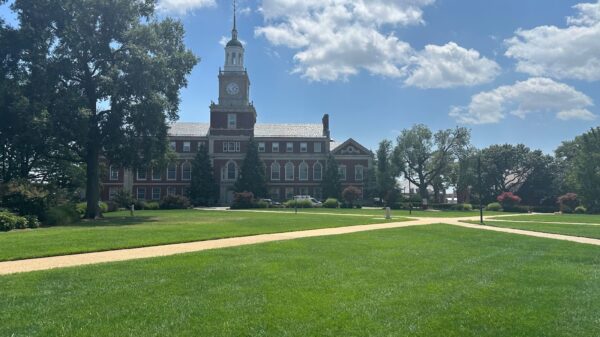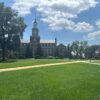President Joe Biden commemorated the 60th anniversary of the founding of the Lawyers’ Committee for Civil Rights during a White House event last Monday. In his speech, President Biden addressed the state of race relations in the U.S., the recent racially motivated shooting in Jacksonville, Florida, and the surge in banned books nationwide.
The event marked a moment of gratitude for past civil rights achievements in the U.S. within the broader theme of the 60th anniversary of the 1963 March on Washington. Attendees recognized that the work of the Civil Rights Movement remains relevant in the modern era, and called for an ongoing commitment to present-day social, economic and political challenges.
During his opening remarks, where he introduced President Biden, Damon T. Jones, president of the Lawyers’ Committee for Civil Rights Under Law, acknowledged the close relationship between the Lawyer’s Committee and the Biden Administration.
“We have worked together to advance the cause of student debt relief, racial equity, police accountability, health equity, fair housing, to defend diversity and inclusion and more,” Jones said.
The Lawyers Committee for Civil Rights Under Law was founded in 1963 in response to President John F. Kennedy’s call for legal action against discrimination. For the past sixty years, the Lawyers Committee has addressed fundamental systemic injustices such as voting rights, education, housing, and employment through litigation.
President Biden highlighted the recent atrocity where a 21-year-old racially motivated white gunman took the lives of three Black people shopping at a Dollar General in Jacksonville, Florida, before committing suicide on the day that marked the 60th anniversary of the historic March on Washington.
“White supremacy is a poison,” President Biden said during the reception. “It’s been allowed to grow faster in our communities, to the point where the U.S. intelligence community has determined that domestic terrorism rooted in white supremacy is the greatest terrorist threat we face in the homeland,” he continued.
The President proceeded with a call for action, discussing the federal civil rights investigation opened in response to the shooting, calling it “[an] act of domestic violence extremism.” President Biden also discussed his administration’s and the Lawyers Committee’s joint effort, the United We Stand Summit which took place last year in the aftermath of the racist mass shootings in Buffalo, New York.
During his inaugural address in 2021, Biden became the first U.S. president to acknowledge the existence of white supremacy openly, and his comments during the event marked the second time he has vocally called white supremacy a “poison.”
Darin Johnson, a professor of law at the Howard University School of Law, views President Biden’s outspokenness on the harmful impact of white supremacy and stance on addressing it as beneficial for civil rights groups like the Lawyers Committee.
“I think it’s a good thing that President Biden is speaking out about the legacy and ill effects of white supremacy,” Johnson said. “As we have seen from the ongoing hate crimes and domestic terror attacks committed against a number of communities, white supremacy is a motivating factor.”
“I think having the standing President be vocal about the importance of addressing white supremacy assists civil rights groups like the Lawyers Committee and others who see [white supremacy] as a principal concern that impacts equal opportunity,” Johnson explained.
The President also shed light on the administration and the Lawyer’s Committee’s work toward police reform and voter suppression, and how working with civil rights leaders and law enforcement enabled him to sign the “most sweeping executive order on police reform ever.”
“We cannot give up until they pass the John Lewis legislation,” President Biden said.
The John Lewis Voting Rights Advancement Act (H.R. 4; S. 4) is proposed legislation in Congress centered around protecting marginalized communities and the amendment of the Voting Rights Act 1965, making it a requirement that certain jurisdictions seek federal approval before making specific changes to their voting laws.
Joseph Sturgeon, a senior history major and Caribbean studies minor from Broward County, Florida, commented on the importance and impact of these provisions. “I think the legislation is good, especially in deep red states led by party leaders that tend to be very reactionary,” Sturgeon said.
“It’s clear that they pass certain voting laws or statutes aimed at suppressing the Black vote. Requiring states to seek federal approval before changing these laws could prevent further harm,” Sturgeon said.
Justin Hansford is a professor of law at Howard University School of Law and the founding Director of the Thurgood Marshall Civil Rights Center, who discussed the significant shift and historical importance yet rarity of American presidents addressing white supremacy.
“They have rarely ever spoken openly about white supremacy,” Hansford said.
“This shift happened after the George Floyd protests and the credit goes to those protesters. You have to look at the shift from pre-George Floyd to post-George Floyd [reactions], which was the moment where everything changed,” Hansford continued.
Hansford also considers Biden’s appointment of Kristen Clark as leader of the U.S. Department of Justice Civil Rights Division, a “very strong move,” as Clark is the first woman to lead the division and a former president of the Lawyers’ Committee.
During his remarks, President Biden also mentioned the recent surge of book bannings nationwide. “Now is the time for all Americans to speak up when history is being erased [and] books are being banned. Diversity is being attacked,” President Biden emphasized.
Hansford stressed the importance of teaching Black history in schools and argued that legal protection is needed because schools are government institutions. “From a legal perspective when people think about free speech, they think about the First Amendment, which protects citizens from the government banning their particular speech,” he said.
“If it is a public school under the law, what they put on a curriculum is not citizen speech, it’s an agent of the government. A public school teacher is an agent of the government, so the government is speaking in the classrooms under the law,” Hansford explained. “Ultimately, it’s up to us as civil rights and human rights lawyers to find a way to defend the right of our people to learn about their history in the classrooms.”
The President shed light on the administration and the Lawyer’s Committee’s work toward police reform and voter suppression, and how working with civil rights leaders and law enforcement enabled him to sign the “most sweeping executive order on police reform ever.”
President Biden also celebrated the increase of appointed Black women in the federal and circuit courts. “We appointed more Black women in the federal courts [and] circuit courts than every other president combined in American history,” President Biden said.
Nadia Gamble, a 1L Law student at Howard University School of Law from Greenville, South Carolina, discussed how she is inspired by Black women being appointed to high-ranking judicial positions.
“I think [their appointments] are powerful and as a young professional, I’ve come to appreciate how important it is to see yourself in prestigious positions,” Gamble said. “To see a representation of what I could be has blessed me and millions of others.”
Oreoluwa Adewale, a 1L student at Howard Law School from New York City, believes there are areas for continued development.
“I don’t feel great about presidents or other people in power who aren’t Black saying how much they’ve done for Black people,” Adewale expressed. “I know he has to say it, but that’s something that should be expected. I’m sure there’s room for improvement.”
President Biden also discussed the Emmett Till Antilynching Act, which made lynching a federal hate crime. “…last month I signed a law establishing the Mamie [Till-Mobley] and Emmett Till National Monuments in Illinois and in Mississippi, and I’m very proud to have done that,” President Biden said.
Solomon Brooks, a senior history major and philosophy minor from Baltimore, Maryland, discussed the significance of the legislation for the Till family and the acknowledgment of the historical injustices.
“Recognition is something that matters in bringing the Till family healing,” Brooks said.
Brooks believes that more can be done to address lynching as a federal hate crime and social media can play a role in raising awareness. “Till shouldn’t have to be a symbolic martyr. This is a start to make lynching a federal hate crime, but much more [can] be built on that foundation,” he said.
“With the advent of the smartphone and social media, it’s easier to publicize lynchings, but I don’t know if I’m optimistic about this,” Brooks said.
Before concluding his remarks, President Biden addressed how the economy has historically affected and currently impacts African Americans.
“Progress means a fundamental break with the trickle-down economics that promised prosperity for all but failed Americans, especially Black Americans for so many decades,” President Biden said regarding the current state of the economy.
Jasmine Bannerman, a junior economics major and African Studies minor from Providence, Rhode Island, also expressed frustration with trickle-down economics viewing it as something that doesn’t work in the nation’s current economy.
“Even if you study theory, you can tell we’re not in a proper market right now,” Bannerman said.
“It’s not as efficient as it should be or could be [with] a housing crisis, increased cost of living around the country and increasing food prices.”
“The direction of this country is to grow in our view from the middle out and the bottom up, not from the top down. That way, everybody does well, the wealthy do very, very well, and everybody has a shot,” President Biden said to the event’s attendees.
Considering the national economic struggles among U.S. citizens, Bannerman credits the Biden Administration’s Student Debt Relief Plan.
“I feel like this is one thing he’s done well and tried to push for. A lot of people have to choose between paying their rent, getting food for themselves or paying their student loan debt, so economically it’s huge” Bannerman said.
President Biden concluded his remarks with a call for unity around the nation declaring, “There’s not a single goal we’ve ever set that we’ve failed to accomplish when we did it together,” said President Biden.
Despite continued calls for unity around the nation, Hansford mentioned that the change in openly discussing white supremacy has not resulted in significant policy change from the Biden Administration or anywhere in the federal government.
“It comes to what we really need, which is reparations, or at least a study for reparations… Does it really make sense to call out white supremacy if you’re not going to do anything about it?” Hansford asked rhetorically.
Copy edited by Alana Matthew









